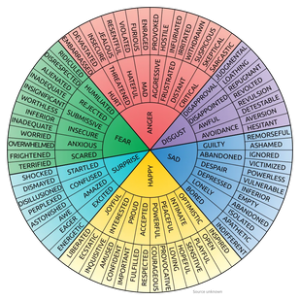7 Ways to Parent Teens Successfully
It is a different ball game in today’s world to parent teens successfully. This generation of teens face a lot of different stressors and pressures than previous generations.
With technology and social media, teens are connected to a much larger world. They are privy to a lot more stimulus and information, including exposure to worldwide issues, and at a much earlier age! I’m pretty sure I was wearing classically “uncool” sweatpants (don’t get me wrong, sweatpants can be cool nowadays) and running around playing make-believe until I was at least 11 or 12. There is a lot of pressure for teens on how they show up in the world – as a social advocate, through body/self image expectations, popularity contests (think likes on social media) etc.

Photo by Amy Treasure on Unsplash
That translates to it being a really challenging time for you as a parent to navigate these dicey waters.
It’s important to acknowledge the challenges when it comes to parenting teens successfully, with our fellow parents and non-parents, to create supportive communities, and talk about the shifts that have happened in parenting throughout the generations. Of course every family/situation is different, but there has been an overall shift to a more authoritative (aka sometimes called balanced) parenting style. This kind of parenting is one with a lot more discussion around things, instead of authoritarian (it’s “my way or the highway”) or passive/permissive (the kids are the boss or do their own thing). You can read a brief definition of some of the parenting styles here.
Many more parents today are wanting to be quite engaged and involved in their parenting, and that’s a wonderful thing! There is an emphasis on making the relationship with your teen a top priority… and if that speaks to you, it may mean pivoting , and learning new skills and approaches.
Here are 7 ways you can parent successfully while putting the relationship first:
Parent Teens Successfully: Listen and Seek to Understand
I hear from teens on a daily basis: “my parents don’t get it. They don’t understand me, and they never will.” etc. While part of this is normal – all teens at some point feel their parents don’t understand them – it is also really indicative that parents need to reconsider their way of listening.
You probably have a lot of advice and wisdom to impart to your teen; experiences to share, and values you want to instill in them. These things are all important! However, the real impact is when you can step back and be a listener more than a talker. When you listen most of the time, and add in wisdom just a little bit of the time, the impact is far greater.

Photo by Bence Halmosi on Unsplash
Parent Teens Successfully: Get to Know Your Teen as A Person
Get really curious about who your teen is! Ask them what they like or enjoy. Ask their opinion on things (I have yet to meet a teen who doesn’t want to share their opinion). What kind of passions do they have? Which hobbies interest them? What doesn’t interest them? Which are the things they dream of doing one day?
You want to create opportunities for quality time to truly get to know your teen as a person.
Buuuut, you’ll need to be careful not to leave them feeling badgered. I know I get caught in the ‘one too many questions’ with my teen… I think the conversation is going great, and then I ask one more question and I get an eye roll, an “I don’t know”, or a “nothing”, said with attitude. That tells me I asked too many questions! Oh well, I can always try again next time.
You can also get curious by getting to know the books and movies your teen is into. Take an interest and read/watch them yourself; ask them things that will get their perspective, it’s a wonderful peak at who they are.
There are 100 questions you can ask your teen in this article – just remember not to ask them all at once!
Parent Teens Successfully: Have a Go – To Venting Place
It is not easy to be a parent and the pay sucks! It is trying on your emotions, and even your own thoughts. A normal part of parenting is to sometimes think things like “I don’t know what to do… they are driving me $%@* crazy…..I don’t know what to say any more.”
It’s Important to have somewhere to go, or someone to talk to; a venting person. This allows you to have a safe space where you can say the things that could be harmful if you said them directly to your teen… I’m not suggesting that you put on a fake facade to your teens and then smack talk them to your friend… But things like “they are driving me crazy! They’re so lazy and won’t clean up after themselves!” are good things to vent to a friend or another parent that will ‘get it’, instead of saying it to your teen.
9 Reasons Every Mom Needs a Venting Buddy is a really great resource that dives into the amazing things venting does for you as a parent; it’s more than getting some complaints off your chest!
Parent Teens Successfully: 70/30 Rule
This is about giving yourself some compassion to not get things ‘right’ all the time; 100% spot on. Set an expectation, or a goal, for yourself as a parent to try and get things ‘right’ 70% of the time, instead of all the time.
You’re going to mess up at some point, say the wrong thing….lose your temper. You might even say something really mean. It’s all okay, as long as you’re leading with love, curiosity, and kindness a lot of the time. Leading in this way 70% (80% would be superstar status!) of the time gives you some leeway when you do mess up. It allows you to go back and apologize, to let your teen know you didn’t handle it the way you wanted to, and move on from there- remember the emotional bank account blog? (Going back and apologizing can be really powerful)!
Don’t shame or blame yourself every time you make a mistake. Instead, think about what you can do next time, how you can clean it up, etc.

Photo by Baylee Gramling on Unsplash
Parent Teens Successfully: Modelling
You can be a powerful influencer for your teen by modelling the behaviours and values you want to see. Things like respectful communication, talking openly about thoughts and feelings, self-care, choosing healthy relationships, etc.
You can model respectful communication by talking to your teen in a calm, respectful, caring tone… This doesn’t mean you’ll receive the calmness back all of the time (or even most of the time) from your teen, but it will allow them to see that it’s a possibility; that it can be done that way. You can show your teen how to have a healthy body image, by practicing things that demonstrate you’re caring for your mental health and that you love your body. For more tips on modelling, this is a really great article: Parents: Role Models and Positive Influences for Parents.
(Check out our upcoming Body Image Workshop for Teens if your teen is needing more help in that area specifically. Information for parents is also included).

Photo by Eye of Ebony on Unsplash
Parent Teens Successfully: Positive Discipline
Positive discipline is using consequences, expectations and rules as a way of teaching rather than punishing. On an unconscious level, punishments or consequences can have the intention of ‘hurting’ your teen in a way; showing them what it feels like, or ‘getting them back’.
Imagine your teen breaks curfew – instead of punishing, ask yourself “what can I teach here? What lesson would I want them to learn?” Discipline can be an opportunity to teach the importance of safety and communication. Going forward, you can set an earlier curfew, no outings for a period of time, or require more check-ins the next time they go out.
For key points around positive discipline, check out this PDF.

Photo by Melissa Askew on Unsplash
Parent Teens Successfully: Let Love Lead
Put the relationship first. No matter what happens. At the end of the day, that’s what’s important.
You want your teen to know they are important to you, that their safety matters, and that they have your support if things go wrong. For example, If your teen is experimenting with alcohol (even though you rrrreally didn’t want them to), you want them to know they can call you if things go awry. Or when it comes to apologizing – letting your teen know you’ve made a mistake, and building that trust with them, is more important than the need to be right all the time.
When you’re communicating with your teen, ask yourself “when I say (or do) this, am I saying/giving them the message that they matter? Am I telling them that this relationship is important to me?” Take an inventory of what sending that message looks like.
This comes up for me a lot when I think of situations with my own teen when I want to nitpick – like when he comes home on time, but full of sassy attitude. It would be so easy to nitpick about the attitude! But when I stop and think – is it more important for me to stop the sass, or can I put the relationship first? Instead of nit picking, I can start a conversation – “How was your night? You seem a little off – is there something you want to talk about?”…..or ignore the sass and notice the timely entrance.
Implementing these 7 ways to parent your teen successfully is a work in progress. Don’t forget the compassion part, and remember to find joy in the journey!
The Happiness Pill Program

I have created a program called The Happiness Pill Program that is designed to bridge the gap between you and your teen, so you can really begin to put your relationship first. The program focuses on a one on one approach where you as a parent will learn to communicate and collaborate with your teen from a better common ground.
After we have begun that work, your teen and I will create a road map of their wishes, goals, and dreams, and the steps to get there. I will be giving them the tools throughout the 6-month program (through group coaching) to navigate bumps on the road, decrease anxiety, increase confidence, build better relationships, love themselves, and ultimately create their own happiness.
All while checking in with you so you can continue to build a strong bond with your teen on their journey to end overwhelm and depression.
You can go to my website below for more details here, or email us at info@pyramidpsychology.com to get on the waiting list.
 Chantal Côté (she/her) is a psychologist and teen life coach living in Calgary, Alberta. After over a decade in non-profit and community mental health, Chantal started Pyramid Psychology, a practice dedicated to supporting teens – a population she is constantly amazed by. Chantal is on a mission to help 100,000 teen girls (and their parents) build bulletproof mindsets so they can weather the ups and downs of life. As part of this goal, Chantal has had the privilege of speaking at various events – virtual and live – to support teens and parents.
Chantal Côté (she/her) is a psychologist and teen life coach living in Calgary, Alberta. After over a decade in non-profit and community mental health, Chantal started Pyramid Psychology, a practice dedicated to supporting teens – a population she is constantly amazed by. Chantal is on a mission to help 100,000 teen girls (and their parents) build bulletproof mindsets so they can weather the ups and downs of life. As part of this goal, Chantal has had the privilege of speaking at various events – virtual and live – to support teens and parents.
Outside of this passion, Chantal is often in nature, writing poetry, playing ball hockey and hanging out with her loved ones.
Each week, Chantal writes a blog article in response to issues she hears from the parents and teens she connects with. If you have something you’d like to read more on – email ideas and questions to info@pyramidpsychology.com or DM us via Instagram or Facebook.

















